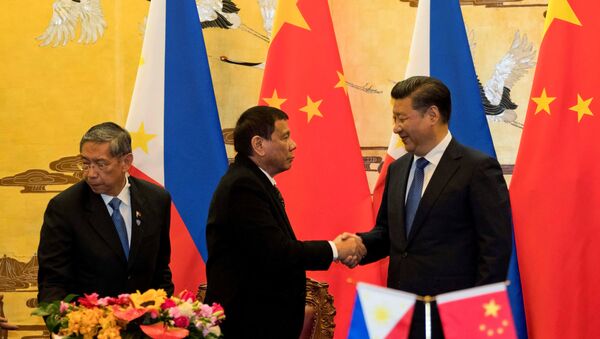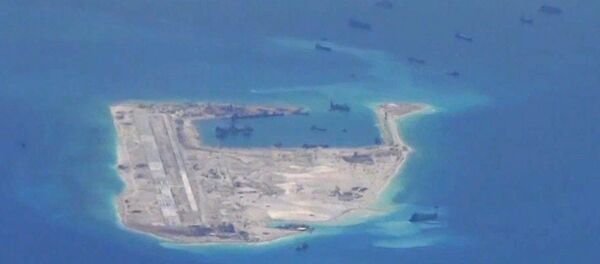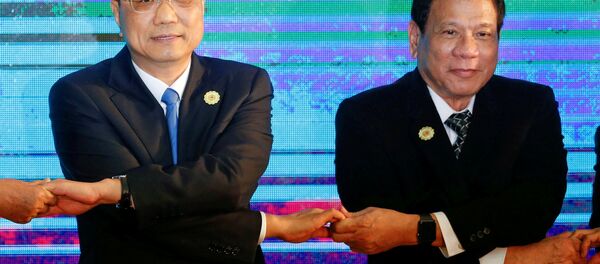Shifting the goalposts Manila, America's longstanding ally, has turned its back on Washington and opened the door to Sino-Philippine cooperation.
"I've realigned myself in your ideological flow and maybe I will also go to Russia to talk to Putin and tell him that there are three of us against the world — China, Philippines and Russia. With that, in this venue, your honors, in this venue, I announce my separation from the United States. Both in military, not maybe social, but economics also," Philippine President Rodrigo Duterte told a business forum in the course of his four-day state visit to China, as quoted by Reuters.
Predictably, Duterte's remarks have triggered deep concerns in Washington.
Although Philippine Trade Minister Ramon Lopez later tried to downplay Duterte's statement in an interview with CNN, by saying that in terms of economic ties Manila won't stop the trade and investment collaboration with the West, it has become clear that the country has made a shift in its foreign policy.
Larisa Efimova, a specialist in Southeast Asian studies at the Moscow State Institute of International Relations (MGIMO), believes that the country will not abandon cooperation with the US, while trying to diversify its contacts.
"The US turned the Philippines from a poor Spanish colony into a more or less modern country. This is a fact. But Washington always considered Manila a very loyal ally. Actually, it thought this until Duterte became president. After he assumed power he began portraying himself as a man who would make no concessions in exchange for national interests," Efimova stressed in an interview with Sputnik Japan.
For his part, political analyst Grigoriy Lokshin admitted in an interview with Sputnik Vietnam that Duterte "dramatically changed Manila's domestic and foreign policy."
"His change of heart towards the US was aimed at China. Duterte wants to receive significant concessions and investments from Beijing," Lokshin underscored.
Back in April 2016 US Secretary of Defense Ashton Carter announced that American troops and military equipment would be sent on regular rotations in the Philippines, while the two countries would also conduct joint patrols in the South China Sea.
Needless to say, The Hague Permanent Court of Arbitration's decision on the South China Sea issued in July 2016 had received high praise from Washington since the court ruled in favor of the Philippines.
However, speaking to reporters on Friday the Philippine President called the ruling a "piece of paper."
On the same very day Philippine Defense Secretary Delfin Lorenzana highlighted that Manila is committed to restoring defense ties with China, Xinhua reported.
Furthermore, in mid-September the Philippine President called for withdrawal of US special forces personnel from the southern regions of the country.
Commenting on the matter, Stephen Kinzer of Boston Globe assumed that US-Philippine joint patrol operations and other military activities in the South China Sea "now seem uncertain."
"The new Filipino government has declared that it will do precisely what the United States does not want: recognize 'geopolitical realities' and begin talks with China aimed at 'peacefully settling our disputes.' There is no danger that these talks could lead to Chinese dominance over the Philippines, Foreign Minister Yasay insisted. Painful experience under the thumb of a 'white big brother,' he said, has produced a national resolve never to allow 'any other nation to bully us'," Kinzer underscored.
According to the journalist, what Washington is faced with is a "blowback for American sins in the Philippines."
"Relations between our countries began with shattering violence. Americans helped crush Spanish power over the Philippines in 1898, but rather than allow independence, the United States took the islands as a colony," Kinzer pointed out, adding that as it turns out "invasions and occupations leave deep scars."




